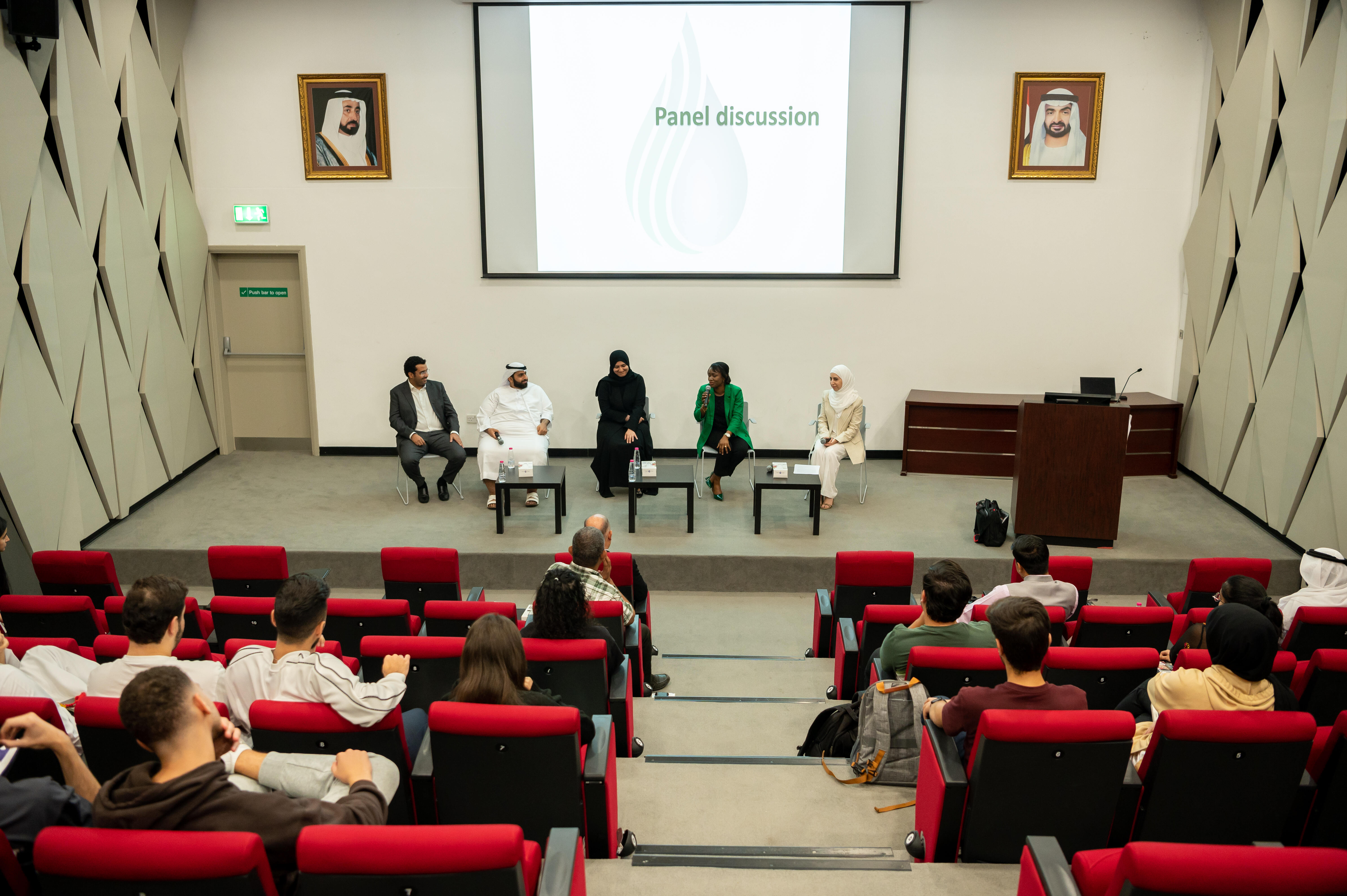Sharjah, UAE – As the world rises to combat climate change and the UAE prepares to host the United Nations Climate Change Conference (COP28) towards the end of this year, the Department of Chemical Engineering at American University of Sharjah (AUS) hosted a talk by the Sharjah National Oil Corporation (SNOC) on understanding global climate change and net zero commitments on May 1.
Held as part of the SNOC’s Carbon Literacy Project that aims to promote education and increase awareness about the importance of net zero goals and environment protection for a sustainable future, the event focused on understanding the meaning of climate change, its effects, human impact and climate remedial action with a focus on the UAE’s Net Zero 2050 strategic initiative.
“This event comes at an opportune time. As everyone is aware, the UAE declared 2023 the Year of Sustainability and is preparing to host COP28, which marks the conclusion of a comprehensive assessment of the progress made in achieving the goals of the Paris Agreement. This event aimed to open channels of collaboration with industry to explore key technological solutions for reduced carbon emission operations and is part of efforts in AUS to spread awareness across the community on actions that can be taken to change lifestyles for a better sustainable future for our planet. All of this, of course, supports the UAE’s goal of achieving net zero by 2050,” said Dr. Rana Sabouni, Associate Professor in Chemical and Biological Engineering at AUS, speaker and event organizer.
The event featured presentations by SNOC subject experts, including Khamis Al Mazrouie, Executive Director of Operations, who spoke about the UAE strategies, COP28 and action plan towards achieving net zero commitments; Rawad Barzanji, Process and Process Safety Team Leader, who discussed SNOC’s action plan toward achieving its set net zero target by 2032; Feras Besher, Process Engineer, who spoke about the global agenda and drive for reducing emission by 45 percent to maintain the 1.5 degrees Celsius goal in 2030 and reach net zero by 2050; and Obiajulu Ani Tawose, Health, Safety and Environment Lead, responsible for managing SNOC’s Net Zero Campaign, who gave an overall introduction about climate change, the impact of human activities on it, effects of climate change and the society circular economy approach towards achieving net zero commitments.
“SNOC has been organizing public sessions with local universities and different partners to spread the message about action against climate change to create what we call beacons of influence that would spread the message among the different communities about the global agenda to tackle climate change,” said Hatem Al Mosa, SNOC CEO.
A panel discussion followed touching on the role of the oil and gas industry in achieving net zero operations; social and economic impact on net-zero commitments; the role of society in building a circular economy that manages production and consumption to tackle climate change. The discussion also covered how those in the industrial sectors, like SNOC, are working to meet their net zero commitments and changing individual lifestyles; as well as how universities and academia, supporting industries, can contribute to meeting net zero targets.
AUS will be playing an influential role at COP28 itself as a member of the UAE’s Universities Climate Network, taking part in discussions and exhibiting at the event. It will also be hosting a number of events and initiatives that are relevant to the COP28 agenda. AUS faculty and students are also engaged in far-reaching research projects that are tackling environmental challenges head-on. From more sustainable hydrogen generation to saving fragile mangrove ecosystems, AUS research is helping protect the environment for future generations.
About AUS:
American University of Sharjah (AUS) was founded in 1997 by His Highness Sheikh Dr. Sultan bin Mohammed AlQasimi, Member of the Supreme Council of the United Arab Emirates and Ruler of Sharjah. Sheikh Sultan articulated his vision of a distinctive institution against the backdrop of Islamic history and in the context of the aspirations and needs of contemporary society in the UAE and the Gulf region.
Firmly grounded in principles of meritocracy and with a strong reputation for academic excellence, AUS has come to represent the very best in teaching and research, accredited internationally and recognized by employers the world over for creating graduates equipped with the knowledge, skills and drive to lead in the 21st century.
AUS values learners not driven only by academic success, but by those that embrace our dynamic campus life and embody our ideals of openness, tolerance and respect. This combination of academic excellence and community spirit ensures AUS is filled with world-class faculty and students, poised to become the innovators, thinkers, contributors and leaders of tomorrow.
About AUS’ Silver Jubilee:
Celebrating 25 years of excellence, AUS is ranked among the top 10 universities in the Arab world, acclaimed for its academic excellence, multicultural environment and outstanding facilities.
Since 1997, AUS has been nurturing and equipping students to become award-winning architects, designers, scientists, journalists, engineers, innovators, researchers, successful entrepreneurs–and even leaders of the UAE’s space program.
AUS offers 28 undergraduate majors and 45 minors, 15 master’s degrees and four PhD programs in the areas of architecture, design, humanities, science, engineering and business. Formed on the American liberal arts model, all classes are conducted in English.
Students apply their learning through internships, research, conferences, competitions and professional collaborations. AUS graduates consistently secure roles with leading regional and international employers, and many pursue graduate studies at the world’s top institutions.
